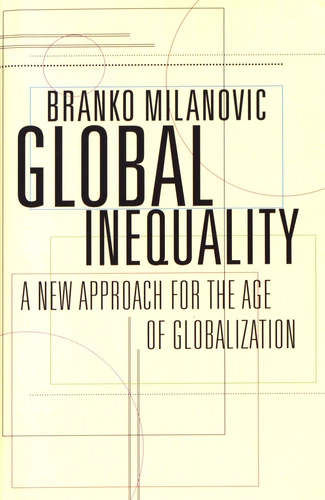Global Inequality. A New Approach for the Age of Globalization
Par :Formats :
Définitivement indisponible
Cet article ne peut plus être commandé sur notre site (ouvrage épuisé ou plus commercialisé). Il se peut néanmoins que l'éditeur imprime une nouvelle édition de cet ouvrage à l'avenir. Nous vous invitons donc à revenir périodiquement sur notre site.
- Réservation en ligne avec paiement en magasin :
- Indisponible pour réserver et payer en magasin
- Nombre de pages300
- PrésentationRelié
- FormatGrand Format
- Poids0.475 kg
- Dimensions14,9 cm × 22,5 cm × 3,5 cm
- ISBN978-0-674-73713-6
- EAN9780674737136
- Date de parution28/04/2016
- ÉditeurHarvard University Press
Résumé
"In this fascinating book, Milanovic is able to articulate the study of inequality between and within countries in the clearest possible way. A must-read." Thomas Piketty, Paris School of Economics. "In Global Inequality, Branko Milanovic continues his lifelong investigation into the past, present, and future of inequality, within and between nations, and in the world as a whole. Full of new and provocative ideas - including Kuznets waves and citizenship rents - the book will cement Milanovic's reputation as one of the most thoughtful and enterprising of inequality scholars." Angus Deaton, Princeton University.
"Continuing with his extraordinarily important work on the empirics of global inequality, Branko Milanovic in this book expands on that work to lay the basis for a more theoretical understanding of the evolution of inequality. It is seen to be the product of two forces : Kuznets cycles of rising and decreasing within-nation inequalities, and convergence of mean incomes among countries. The relative strength of these two forces has profound political implications : Shall we live in the world of class cleavages, or of huge international income gaps ? Is the world to be ruled by the global top 1 percent or by a large global middle class ?" Joseph Stiglitz, Columbia University.
"Continuing with his extraordinarily important work on the empirics of global inequality, Branko Milanovic in this book expands on that work to lay the basis for a more theoretical understanding of the evolution of inequality. It is seen to be the product of two forces : Kuznets cycles of rising and decreasing within-nation inequalities, and convergence of mean incomes among countries. The relative strength of these two forces has profound political implications : Shall we live in the world of class cleavages, or of huge international income gaps ? Is the world to be ruled by the global top 1 percent or by a large global middle class ?" Joseph Stiglitz, Columbia University.
"In this fascinating book, Milanovic is able to articulate the study of inequality between and within countries in the clearest possible way. A must-read." Thomas Piketty, Paris School of Economics. "In Global Inequality, Branko Milanovic continues his lifelong investigation into the past, present, and future of inequality, within and between nations, and in the world as a whole. Full of new and provocative ideas - including Kuznets waves and citizenship rents - the book will cement Milanovic's reputation as one of the most thoughtful and enterprising of inequality scholars." Angus Deaton, Princeton University.
"Continuing with his extraordinarily important work on the empirics of global inequality, Branko Milanovic in this book expands on that work to lay the basis for a more theoretical understanding of the evolution of inequality. It is seen to be the product of two forces : Kuznets cycles of rising and decreasing within-nation inequalities, and convergence of mean incomes among countries. The relative strength of these two forces has profound political implications : Shall we live in the world of class cleavages, or of huge international income gaps ? Is the world to be ruled by the global top 1 percent or by a large global middle class ?" Joseph Stiglitz, Columbia University.
"Continuing with his extraordinarily important work on the empirics of global inequality, Branko Milanovic in this book expands on that work to lay the basis for a more theoretical understanding of the evolution of inequality. It is seen to be the product of two forces : Kuznets cycles of rising and decreasing within-nation inequalities, and convergence of mean incomes among countries. The relative strength of these two forces has profound political implications : Shall we live in the world of class cleavages, or of huge international income gaps ? Is the world to be ruled by the global top 1 percent or by a large global middle class ?" Joseph Stiglitz, Columbia University.







